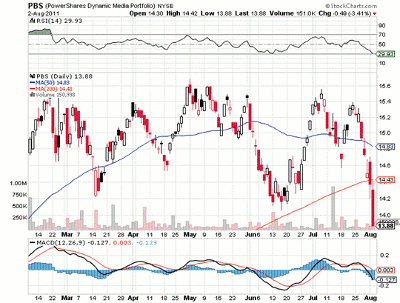A media ETF is in play following new earnings reports from CBS Corp., Comcast, and Time Warner, which will determine if the fund can recover recent losses, or if this is a story not fit for some viewers.
Now that the debt ceiling has been raised, investors can get back to focusing on corporate earnings in order to drive market performance. Although the economy is still sluggish, these quarterly updates have been keeping many sectors afloat, especially in consumer-focused industries where spending is down but profits are still relatively healthy at many firms.
One such case is at CBS Corporation (CBS), which reported its second-quarter earnings after the bell on August 2. Net income came in at 58 cents per share, or 13 cents per share above estimates, while revenues were slightly above expectations, outpacing the consensus by roughly $40 million.
While this is undoubtedly encouraging for the broader media industry, a number of other reports could help to set the record straight on this corner of the market, either confirming the positive trend set by CBS, or demonstrating that the broadcaster’s performance is just an aberration.
Both Comcast (CMCSA) and Time Warner (TWX) gave their quarterly updates yesterday (Aug. 3), helping to give investors a much clearer picture of the broad media industry and its recent performance. TWX was looking to post profits of 56 cents per share on revenues of roughly $6.81 billion.
Time Warner is more impacted by movies than many of its other peers in the space, so box office trends could influence this stock more than most. With that being said, the company did call for higher Q2 earnings in its first-quarter conference call, so expectations were high for the media conglomerate.
Meanwhile, at Comcast, investors will likely focus on the firm’s integration of NBC Universal, as this will be the first quarter that CMCSA has had a controlling stake in the media distributor. Additionally, investors are likely to compare Comcast’s results to Time Warner Cable (TWC), which reported last week.
In that report, the company reported that it lost more subscribers than it did in the year-ago period, although many analysts do not anticipate that Comcast will suffer the same fate. Nevertheless, investors will focus in on the subscriber loss figure in order to see if it is less than the losses the company saw last year, when 265,000 people canceled their Comcast service.
Clearly, all three of these media giants will impacted by different market factors, so many analysts will likely gauge the performance of all three in order to better ascertain how the market could perform here in the second half of the year.
NEXT: The Media Industry ETF That's Under Fire This Week
|pagebreak|Thanks to these key earnings reports, investors should look for the PowerShares Dynamic Media Fund (PBS) to remain in focus throughout this week’s trading sessions. The fund gives at least 5.2% to Comcast and Time Warner, and a similar weighting to CBS as well. As a result, PBS could be in for some significant volatility this week, as more than 15% of its underlying assets will be digesting earnings reports, helping to shift sentiment on some of the smaller names in the fund as well.
Despite the extremely weak economy and the relatively discretionary nature of the services offered by the components of PBS, the fund has managed to hold its own relatively well in 2011, gaining 3.2% since the start of the year.
However, losses have begun to pile up over the last few months, and the fund is now down 7.6% over the past quarter, suggesting that quality earnings reports will be needed in order to turn things around. As you see here, the last few days have been quite ugly:
If both Comcast and Time Warner can pass through the earnings spotlight and give a decent outlook for the future, investors could see a return to strength for this fund.
If, however, weak earnings hit the market and more investors fear further fiscal austerity, PBS could continue its short-term trend lower and finish out this week continuing to trade in the red.
By Eric Dutram of ETFdb.com












